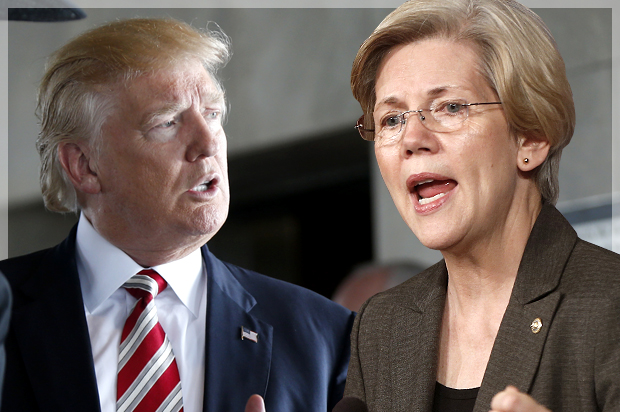There’s no question that Republican Donald Trump relied on support from people on the far right in order to defeat Democrat Hillary Clinton. But it’s also true that Trump’s victory was made possible by voters looking for economic policies preferred by progressives.
That theme is one that’s increasingly emerging from leading congressional liberals in light of Tuesday’s surprising presidential election results.
In a news release, Sen. Bernie Sanders, I-Vt., Hillary Clinton’s former rival for the Democratic nomination, argued that Trump’s victory was enabled in part by people tired of the neoliberal economics that have dominated both major political parties for decades.
“Donald Trump tapped into the anger of a declining middle class that is sick and tired of establishment economics, establishment politics and the establishment media,” Sanders said.
“To the degree that Mr. Trump is serious about pursuing policies that improve the lives of working families in this country, I and other progressives are prepared to work with him. To the degree that he pursues racist, sexist, xenophobic and anti-environment policies, we will vigorously oppose him,” the senator concluded.
Sanders’ remarks are similar to those of Massachusetts senator Elizabeth Warren, who argued in a Thursday speech to the AFL-CIO that while she disagreed strongly with Trump on some areas, many of the real estate billionaire’s professed views put him at odds with the economic conservatives who have dominated Republican politics for more than 50 years.
“Donald Trump won the presidency under a Republican flag,” Warren was quoted by The Boston Globe as saying. “But Mitch McConnell, Paul Ryan, and the Republicans in Congress — and their way of doing business — were rejected, rejected by their own primary voters, rejected during the campaign, and rejected in Tuesday’s election.”
The two senators’ sentiments are more than just spin. Many people who had supported Barack Obama in his two presidential campaigns appear to have switched their vote to Trump. According to a Washington Post study, over 200 counties that Obama carried in 2008 and 2012 supported Trump in 2016. Overwhelmingly, the counties are concentrated in the so-called Rust Belt, the north-central region of the country that once housed many manufacturing plants that have since closed, leaving behind a pattern of unemployment and underemployment.
But the Rust Belt wasn’t the only region where Trump managed to attract support from voters seeking a departure from conventional economic conservatism. Nationwide, according to exit polls, the Republican presidential nominee lost union voters by a mere 8 percentage points. By comparison, in 2012, Republican nominee Mitt Romney lost them by 18 percent.
Trump voters also helped deliver victories to advocates of raising the minimum wage in all four states that which featured ballot initiatives on Election Day. Arizona, Colorado and Maine voters approved upping their states’ minimum hourly wage to $12, while voters in Washington state approved a measure increasing theirs to $13.50 an hour.
In each state, support for higher minimum wages outstripped the combined support for both Hillary Clinton and Green Party candidate Jill Stein. In Maine, voters approved Question 4, with 55 percent in support and 45 percent against. Stein and Clinton combined earned just under 50 percent of the vote. Question 4’s victory is notable since it also prevailed over a smaller wage-increase initiative promoted by Republicans.
In Arizona, Proposition 206, which required employers to provide mandatory sick leave as well as a higher minimum wage, passed with just under 59 percent support. By contrast, Clinton and Stein’s combined vote share was only 46.6 percent. The results were the same in Colorado, where the leading left and center-left candidates earned 48.6 percent of the vote, while Amendment 70 (boosting the minimum wage) passed with 54.5 percent.
This year’s victories mean that advocates of higher minimum wage laws are continuing their undefeated streak. Since 2000, no ballot initiative proposing a higher mandatory minimum wage has been defeated. In large measure that is because many grassroots Republicans are joining Democrats in voting for them.
“When it came time for voters to put an X next to their priorities, they came down heavily in favor of economic equality and economic fairness,” said Jonathan Schleifer, executive director of the Fairness Project, a nonprofit organization that promotes minimum-wage ballot initiatives at the state and local levels. Such initiatives have become a central focus of proponents of the minimum wage, largely because federal action has been impossible in recent years since congressional Republicans refuse to pass such legislation.
“We don’t work with the federal government on policy issues partially because it’s been so broken at this point, so dysfunctional, that we’ve had to go around them at the state and municipality level to get anything done,” he told Salon in a phone interview last week.
While Americans support setting a higher minimum wage at the federal level, it’s not clear whether President-elect Trump will force more conventional Republicans to buck their large donors, like the Koch brothers, who oppose wage increase laws. During his campaign, Trump made conflicting statements about the subject but he appeared to settle on a call for increasing the federal minimum to $10 per hour. The president-elect also recently stated in an interview with The Wall Street Journal that he was willing to keep at least two major provisions of the Affordable Care Act, one prohibiting insurance companies from denying coverage to people with pre-existing health conditions and another allowing parents to keep their adult children on their policies past age 21.
Throughout his time on the trail, Trump spoke of his desire to advocate for the “forgotten men and women of our country.” Congressional progressives appear eager to find out how much he means it. To paraphrase Trump in another context, what have they got to lose?

